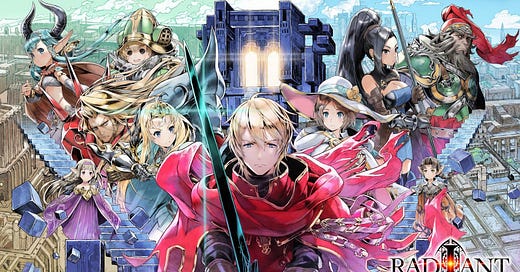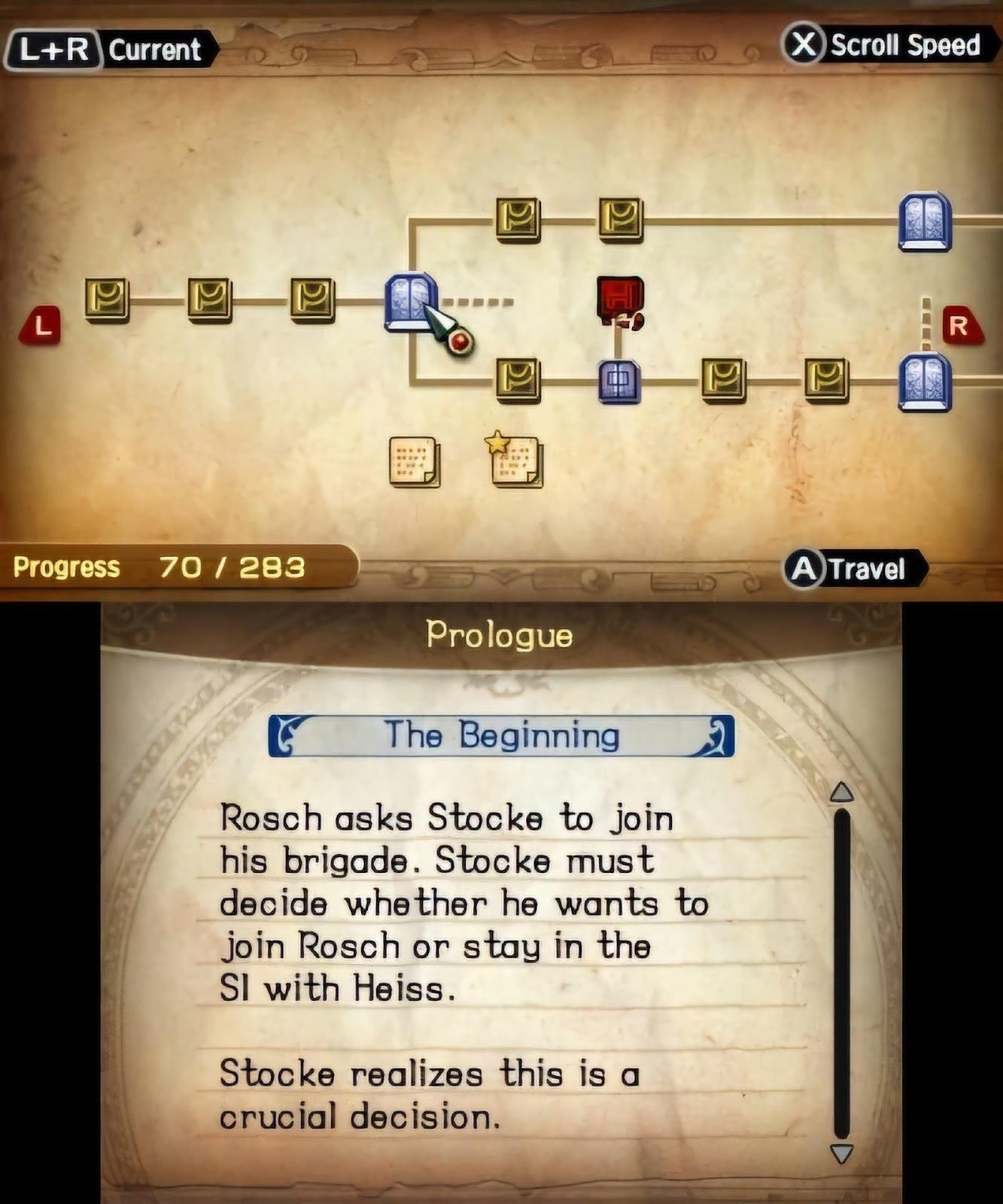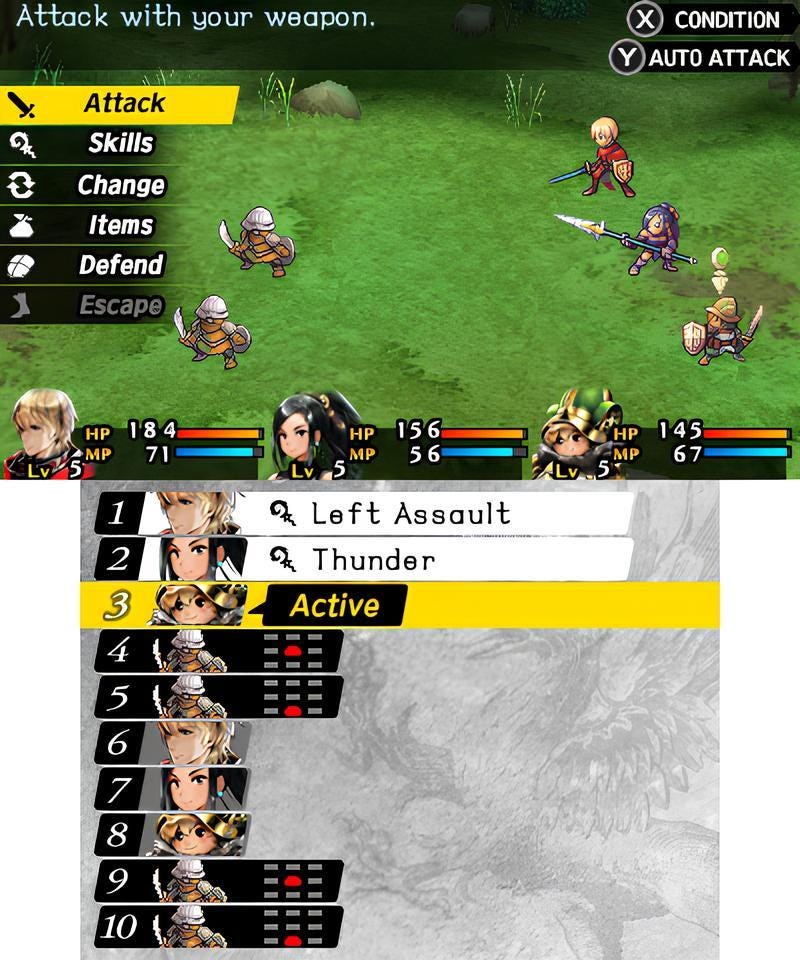Radiant Historia: Perfect Chronology review
Mark Falconer reviews Radiant Historia: Perfect Chronology, a 2011 JRPG. Does it stand the test of time or will it fade into history?
Radiant Historia is a JRPG developed by Atlus (Persona, Shin Megami Tensei), released in North America in 2011 for the Nintendo DS. In 2018, a remake Radiant Historia Perfect Chronology was released in North America for the Nintendo 3DS.
My story with this game begins with me earlier this year listening to random JRPG battle music while making decks for the card game I play. Out of the entire playlist I found on YouTube, one song stuck out to me. That song was The Edge of Green, one of the main boss themes from Radiant Historia. I listened to this song on repeat for the rest of the night. Once I finished what I was doing, I grabbed my 3DS and bought the game. This game is the very last purchase I made before the 3DS eShop went down. I had heard of this game before but I knew nothing about it beyond the song I've listened to.
Before we get started, I'll give a brief recap of the beginning of the game. There will be spoilers going forward. If you want to remain spoiler free, this is the last chance to turn back.
The story of Radiant Historia takes place on the continent of Vainqueur, a once prosperous land where roughly half of the continent has turned into sand through desertification. On the remaining fertile land a war wages between the two main powers of the continent, The Kingdom of Granorg and Alistel, to control what greenery remains of the dying world.
You play as Stocke, an agent for Alistel's Special Intelligence Division. Stocke is assigned to rescue a fellow agent who has critical information about Grangorg's military plans. Before you head on the mission, your boss, Heiss, assigns you two subordinates, Raynie and Marco, to help the mission proceed smoothly. Heiss also gives you a book known as the White Chronicle as a good luck charm.
Stocke's crew goes on the mission and everything falls apart. The informant they were meant to protect is killed. Raynie and Marco are killed shortly after and Stocke is critically wounded. Stocke makes his escape and the White Chronicle begins to glow teleporting him away to a mysterious place.
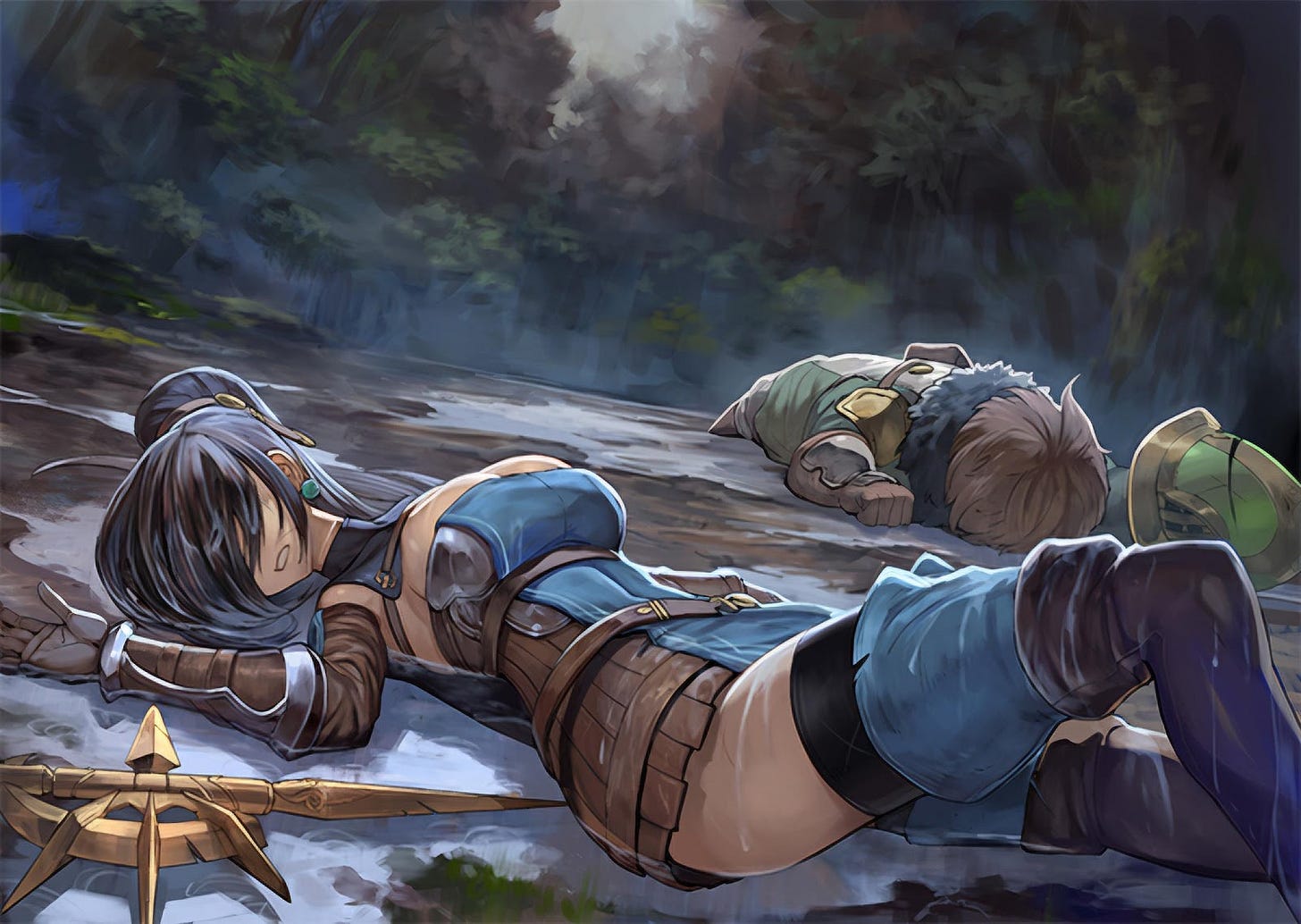
Stocke wakes up in an unfamiliar land and is greeted by two mysterious people, Teo and Lippti. They inform Stocke that he's in a land known as Historia, the root of all history, and they are the guardians of history trying to save the world from desertification. The two also inform Stocke of the White Chronicle's true power: the ability to travel across time to points that Stocke has experienced himself and are major turning points in history.
Armed with the knowledge of what will happen, Stocke travels to the past and saves the informant, Raynie, and Marco. Once Stocke's mission is complete, he returns to Historia and is asked by Teo and Lippti to help save the world from desertification by traveling through time to find the one true history. Stocke agrees to help and begins his journey to save the world.
The main story of Radiant Historia is fantastic. You travel across two main timelines throughout the majority of the game. It offers a unique way of storytelling that I haven't experienced before. Things you do in one timeline affect the other in turn. For example, saving a merchant in one timeline makes them appear in the second timeline, opening the way for you to proceed.
Radiant Historia is filled with moments like these which is a very fun way to tell the story. As a result, you do end up backtracking a lot. You constantly travel back and forth between the two timelines. And they end up traversing many of the same places. There's one location in the game you visit 4-5 times for various reasons. While I didn't mind the backtracking and repeat visits, I do acknowledge that it can be a turn-off for some.
There are three main parts of the story. In the first portion of the game, you're constantly jumping across the two timelines, progressing both of them at almost equal rates. You're bombarded with constant turmoil and emotionally charged moments that personally motivated me to keep on playing and change history for the better. In the second portion of the game you don't move throughout the two timelines as much. There are significant parts of the second portion where you can only progress one timeline for a long time. To me, it felt detached from the storytelling the game presented up to this point. The story itself remained amazing. The way the story was delivered however was disappointing. The second portion is definitely the low point of the game.
The last third of the game features more of what made the first portion so great: Frantically jumping across timelines to save the world with emotionally charged storytelling. It was a great return to what made me invested in the story and characters of Radiant Historia and the ending did not disappoint.
Something I really like about this game is the plethora of bad endings you can get. Throughout the game, you're constantly making choices that affect the timeline. If you make a wrong decision it results in a bad ending. These range from the world ending to saving the world at a huge cost, creating an even bigger war for the world of Vainqueur, and so much more. You're never punished for getting a bad ending either, you're encouraged to do so for 100%. If you ever get a bad ending, once the cutscene is over, you can go back to any point in the game you're able to travel to.
Seeing all the bad endings you can get was a ton of fun and works really well with the story. It highlights how every action that you make as Stocke has its consequences, intended or unintended, and how those choices you make be it big or small can majorly affect history. The bad endings were an unexpected highlight of the game and Radiant Historia wouldn't be the same without them.
Perfect Chronology has two new sections of the game that you can access. The first is Possible Histories. These are what-if scenarios that unlock throughout the course of the game. It puts the characters into one-off worlds where they have to solve the crisis the world is facing.
In Perfect Chronology, there exists a new chapter that you get access to after you beat the main story. This new chapter creates a new ending for the story. I really enjoyed the new ending. While this new ending is great, it's completely different from the original ending in every regard. But the existence of this new ending is fitting as it ties into the theme of the game. Creating a new history to save the world and everyone you care about, no matter the cost.
The characters and character interactions are where this game truly shines. There are seven main playable party members that contain most of the interaction amongst each other. To me, the stand-out character was the main character Stocke. He starts cold towards people at the very beginning of the game, making you think he's going to be a standoffish protagonist. The game immediately turns that on its head once he gets access to the White Chronicle. Stocke turns into a person who wants to make sure that everyone he cares for survives on his quest to save the world from desertification.
One of my favorite moments of his is where he can't save someone. Seeing him grapple with the reality that nothing he's done can change the outcome was really refreshing to see. It set the tone for the rest of the story that some things can't be changed and made every dangerous moment the party encountered after that have stakes and tension.
The other standout character in my opinion was Rosche, Stocke's best friend and newly promoted general in the army. His arc takes place in the first half of the game and was the driving force of my favorite section of the story. Before the game started, Rosche lost his arm in battle and has an experimental mechanical arm in its stead by the Alistel Army. Rosche puts all of his being worthwhile general to his new recruits and repays his debt to Alistel for giving him a new arm. The challenges he faces and seeing how he deals with them is what got me hooked on the game and had me playing whenever I could. While he takes a backseat in the second half of the game, his story made him a character I soon won't forget.
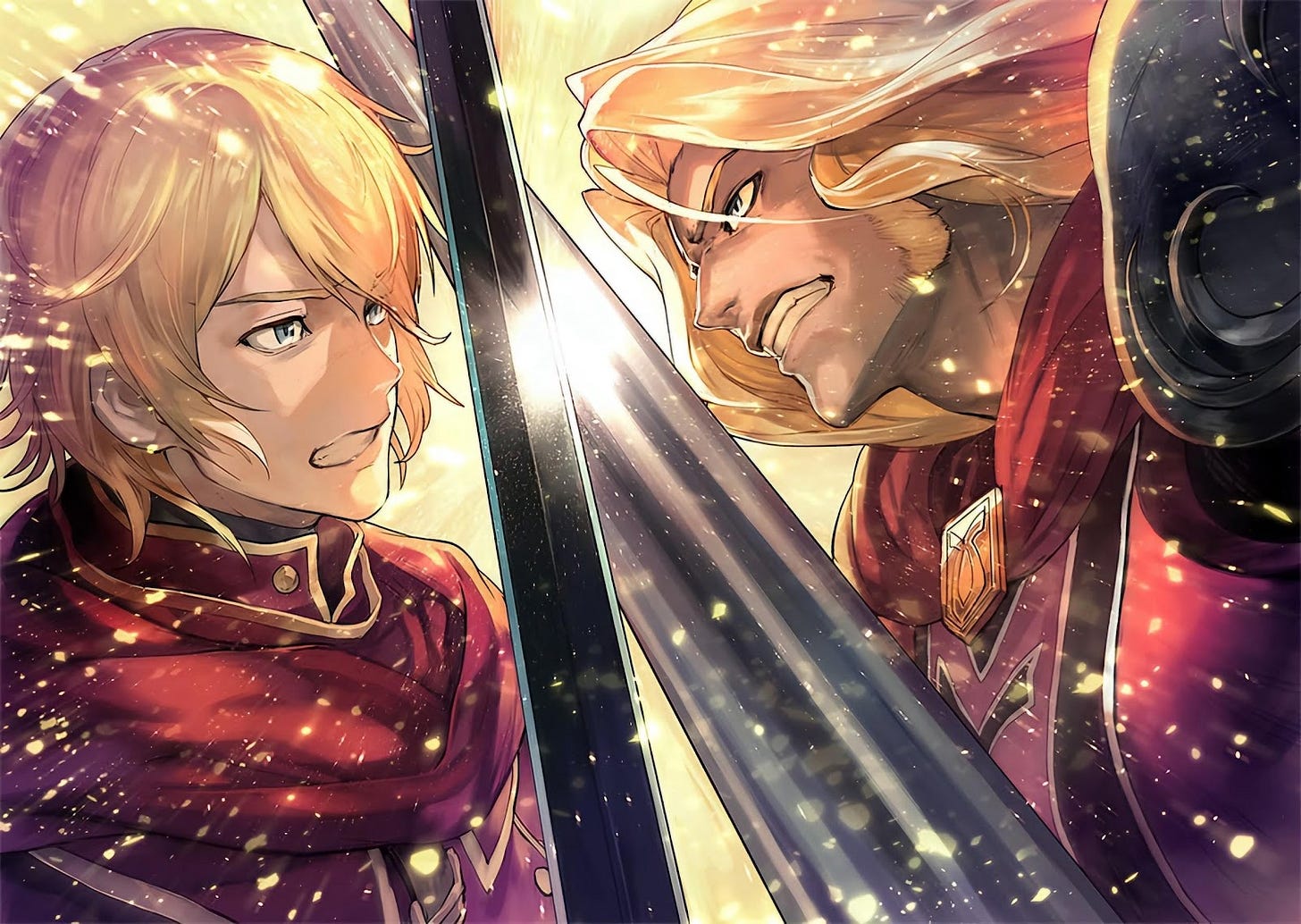
Unfortunately, the main weakness of the game and characters in my opinion are the antagonists. To preface, all of the major antagonists you encounter in the game are incredible characters. Seeing them politic with each other and scheme to get an upper hand on one another and the main party is amazing. The game does an amazing job of giving them motivation for why they do the things they do. My main issue is that you do not get to fight the majority of them. One of my favorite parts of games is the climactic fights between the heroes and villains that have been building throughout the whole game. Of all the major antagonists in the game, you only fight two of them.
Most of the villains were defeated in cutscenes. It was deflating, to say the least. Worst of all, there was set up for fights for some of them, so it seems like somewhere in development they decided against it. With the remake, most of the villains got a new ending as well. In my opinion they weren't well done or deserved. Some of the villains do vile actions, so to see a new ending where they get "redeemed" is way out of place. I understand what the developers were intending and it does fit in the themes of Radiant Historia as a whole. However, I do overall prefer the original conclusion to the villain's stories.
The biggest offender of a villain getting redeemed is Hugo. Hugo is a general in the Alistel Army and is the speaker for the Prophet Noah, the founder of Alistel and a Godlike figure to the people. Before the events of the game take place, Noah used to address the people of Alistel himself about his teachings. When Noah became ill and could no longer address the people himself, Hugo would deliver Noah's speeches to the public for years to come.
Over time Hugo became ambitious and used the people's trust against them. Hugo would give speeches under the guise that they were Noah's own words continuing the war against Granorg and sparking conflict with other nations. Hugo's arc comes to a head when the people of Alistel demand to see Noah for the first time in years and hear his words out of his mouth. Hugo brings out a mannequin in disguise as a last resort.
When it's discovered that Hugo had lied, most of the people of Alistel lose their faith in Noah and Alistel as a whole and assume Noah is dead. The party confronts Hugo a bit later and finds him drunk on newfound power and obsessed with Noah and bringing his ideals to a reality no matter the cost. After the fight with Hugo, he dies in a blaze standing up and hallucinating about Noah with the happiest smile on his face.
The remake introduces a new ending for Hugo. In the Possible History timeline, you are given an item by an alternate version of Noah. When you return to the main timeline confront Hugo with this item in hand, Hugo reveals that Noah is in a comatose state and the item you were given can save him with an operation. The operation is a success, and Noah wakes up causing Hugo to instantly drop his ambitions to be with Noah as that's all Hugo had wanted. Noah asks a favor of the party to tell the world that he and Hugo have died, believing that the two of them being presumed dead would benefit the world better than being alive. They travel the world in secret helping people however they can and spreading the belief to help themselves and each other of their own free will.
I dislike the new ending for Hugo and much prefer the original ending. It redeems a character who I believe was not originally intended to have a redemption arc. Hugo's actions were for himself and he used everyone and everything to his advantage. Because of Hugo, multiple people died either directly or indirectly. I believe the original ending for him was incredibly impactful. Seeing him on fire and basically running away from the consequences of his actions through death was one of my favorite scenes. Not only did it deliver a satisfying end to an antagonist, which hadn't happened at this point, but having him hallucinate visions of Noah was the cherry on top. Hugo had died not regretting a thing and it seemed almost martyr-like, believing his actions were just and done for Noah and his ideals.
His death was completely clashed with the tone of the game in a good way. The new ending may have seen Hugo change his ways for the better but in my opinion he hadn't earned it. When the party confronts Hugo he's obsessed with Noah. The new ending gives him exactly what he wants and he still hasn't faced any consequences for his actions. It took the only villain with a satisfying end and made worse change. That being said, I'm OK with this new ending being in the game as it ties into the theme of the game of constantly rewriting history and giving everyone the best possible future they can have even those that don't necessarily deserve it.
At its core, Radiant Historia is a turned-based JRPG. Battles are done by the party taking turns to defeat the enemies. Radiant Historia does do things a bit differently. First, the enemies you face are on a 3x3 grid. The position the enemies are in determines how much damage they take, how much damage they do to the party, and determines what attacks can hit. You have a ton of attacks that influence where on the grid the enemies end up. You can even stack enemies together to attack multiple enemies with a single attack. Some attacks only fit on certain parts of the grid so positioning and strategy are key during combat.
The way you take your turn in combat is also done differently. There is a queue of who gets to take their turn next. The game tells you the next 10 turns. As the player, you have the option to switch your current turn with anyone else, friend or foe. If you do switch your turn, you get a temporary status ailment that makes you take more damage and take critical hits more frequently, offering risk vs the reward of multiple attacks in a row. As a player, you can get up to 10 guaranteed turns in a row if you play your cards right leading to an opportunity to deal massive damage before your enemy can respond.
Radiant Historia also features a combo meter that shows you how many times you've hit an enemy during your turn. The higher the meter goes, the more damage you do and the more experience you earn, making it optimal to have multiple turns in a row and build the combo meter. Lastly, there is a mechanic called the mana gauge. When the mana gauge fills for one of the party members, they can either get rid of an enemy's turn or perform an incredibly powerful attack adding an additional layer of strategy.
Overall, I really loved Radiant Historia: Perfect Chronology. The story captivated me from start to finish and the gameplay was incredibly satisfying, especially the further I went into the game. There's no game that I've played that is quite like this. If you are a turn-based JRPG fan you owe it to yourself to play this game. I wish there was a sequel to this game. The storytelling and gameplay were incredibly fun to only be featured in one game. However, if a sequel does happen I'd like a new world, as the story concludes satisfyingly.
Rating: 9/10

